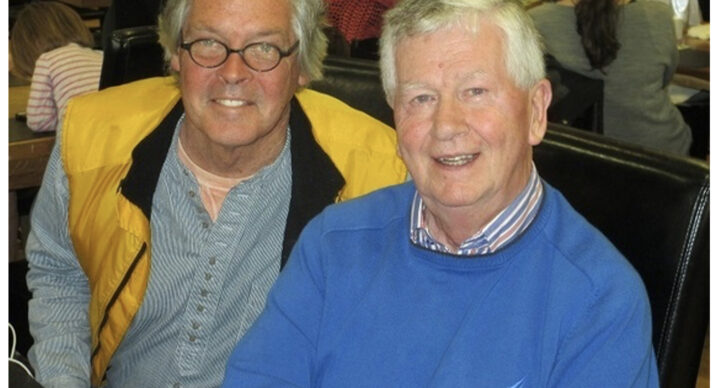
Posted October 25, 2023
By Greg O’Brien
“Bad actors…using it for bad things”
“Only be careful, and watch yourselves closely so that you do not forget the things your eyes have seen or let them fade from your heart as long as you live.”— Deuteronomy 4:9
The Old Testament has a lot to say about the heart, the soul. In some ways, perhaps, more meaningful today than in the 7th Century when written. The warning signs are clear.
In the fascination with Artificial Intelligence and some of the good it could bring forth, it’s critical to make sure, with proper oversight, that technology does not steal our souls, our humanity. Yet, it could happen.
Notes the website Built-In, “Artificial intelligence (AI) is a wide-ranging branch of computer science concerned with building smart machines capable of performing tasks that typically require human intelligence” —in essence displaying or expanding on the proficiencies of the human mind.”
At first glance, this sounds wholly impressive. But is it?
A vociferous alarm was sounded last May when Geoffrey Hinton, dubbed “a
Godfather” of Artificial Intelligence, stepped down as Google vice president and engineering fellow, and head-on confronted the perils of AI. In an interview with The New York Times, Hilton warned “generative intelligence could spread misinformation and, eventually, threaten humanity.”
Hinton, the Times reported, has “joined a growing chorus of critics who say those companies (engaged in AI research) are racing toward danger with their aggressive campaign to create products based on generative artificial intelligence, the technology that powers popular chatbots like ChatGPT…It is hard to see how you can prevent the bad actors from using it for bad things.”
Days later in an MIT Sloan School interview, Hinton said, “I think it’s quite conceivable that humanity is just a passing phase in the evolution of intelligence…It (artificial intelligence) may keep us around for a while to keep the power stations running, but after that, maybe not (once) we’ve figured out how to build beings that are immortal. These digital intelligences—when a piece of hardware dies—they don’t die. If … you can find another piece of hardware that can run the same instructions, you can bring it to life again. So we’ve got immortality, but it’s not for us.”
NBC News also reported recently, “Researchers around the world are training AI to re-create images seen by humans using only their brain waves. Experts say the technology is still in its infancy, but it heralds a new brain-analysis industry…The results are startling and dreamlike… A team of researchers…has shown they can decode human brain scans to tell what a person is picturing in their mind”.
If /when Artificial Intelligence and robots one day surpass our intelligence, humanity might become more like the Scarecrow in The Wizard of Oz, wishing, with apologies to songwriters Harold Arlen and Yip Harburg: “If I only had a (main frame) brain.”
Potentially there are unlimited applications for AI, as the “bad actors,” as Hinton calls them, gin up the possibilities, like modern day Frankenstein’s. One of them is Artificial Intelligence control over depressions, anxieties, Alzheimer’s, other forms of dementia, and other disorders—where AI takes over the mind.
This is personal to me. Alzheimer’s stole my maternal grandfather, my mother, paternal uncle, and before my father’s passing, he too was diagnosed with dementia —a disease that now has come for me.
I don’t think I’m alone in this, but I have far more faith in researchers and pharmaceuticals finding cures than manipulations or computer chips in the brain, somewhat like the remake of the movie The Manchurian Candidate. In the dementia journey, where Alzheimer’s itself can take 20-to-25 years to run its devilish course, it’s all about saving self, not losing it!
I’ve put my faith in preserving self and in the experts racing for a cure that does not short-circuit the brain. Alzheimer’s and other forms of dementia have been around a long time, and it will take time to find the cure, with backing from organizations such as the Cure Alzheimer’s Fund of Boston with its Harvard- MassGeneral connections and world expert on Alzheimer’s research Dr. Rudy Tanzi (https://www.massgeneral.org/neurology/mccance-center/clinic/shield)
It was Helen Keller who said with great foresight, “We could never learn to be brave and patient if there were only joy in the world.”
The blending of science and the soul, I believe, will bring triumph. But it will take time and patience. Researchers bring both extraordinary skills and passion to this fight, while the rest of us strive to bring to the battlefield our enduring humanity and compassion, emanating from the soul, not a manipulation of the mind, our memory.
There is strength in numbers, in walking in patience, in faith, and in hope, as I also do in my advancing prostate cancer, memory loss, deep depression, and ongoing breakdown of the body.
“Memory is everything. Without it we are nothing,” observed neuroscientist Eric Kandel, winner of the 2000 Nobel Prize for his groundbreaking research on the physiology of the brain’s capacity for memory. Memory is the glue, Kandel said, that binds the mind and provides continuity. “If you want to understand the brain,” his late mentor, eminent neurologist Harry Grundfest, counseled him, “you’re going to have to take a reductionist approach, one cell at a time.”
Cell by cell, Kandel took the brain apart. Had he dug a bit deeper, he might have found that my late mother was right about memory. While memory offers delineating context and perspective, it doesn’t define us. The definition is found in the spirit, but one must dig for it. “An unexamined life,” Socrates once said, “is not one worth living.”
Alzheimer’s isn’t just your grandparents’ disease. It has been around a long, long time under various designations.
About 2,400 years ago Plato described an illness that “gives rise to all manners of forgetfulness, as well as stupidity.”
About 2,000 years ago, the Roman poet, Juvenal, characterized a phenomenon: “Worse than any loss in the body is the failing mind which forgets names… and cannot recognize the face of the old friend who dined with him last night, nor those of the children whom he has begotten and brought up.”
Scripture, unwittingly, may have put an exclamation point on Alzheimer’s and other forms of dementia in John 21:18
“When you were younger, you dressed yourself, and walked wherever you wanted.
“But when you are old, you will stretch out your hands, and someone else will dress you, and carry you to places you do not want to go.”
I’m being carried today to places I don’t want to go, but with the full assurance that this journey with experts, not mad scientists, eventually leads out of the valley to a promised land. I may not get there, now at 73, but humbled to be among the torchbearers.
I hope with all my heart for effective treatments and a cure for Alzheimer’s, but I cannot put my faith in technologies that might help our bodies and minds at the risk of our souls and humanity.





